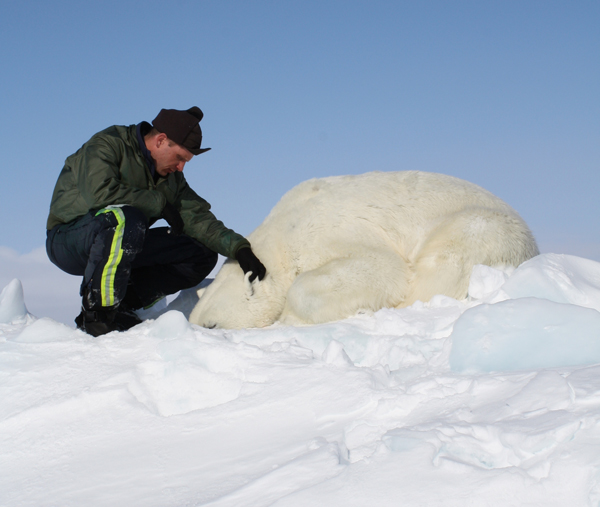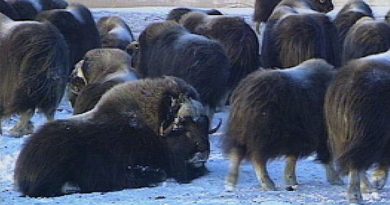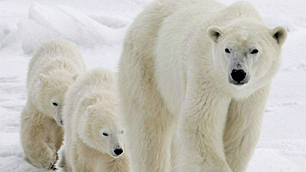Chukchi polar bear population remains healthy as ice coverage lessens

The Chukchi Sea has one of the highest rates of sea ice loss in the Arctic, but the polar bears there don’t appear to be suffering as a result.
A new study from the U.S Fish and Wildlife Service shows the Chukchi Sea bears are just as healthy as they were 20 years ago. The bears still face a grim long term future, but the new research shows there will be a lot of nuance along the way in how climate change plays out for polar bears in the Arctic.
U.S Fish and Wildlife Service Biologist Eric Regehr has studied more than 250 polar bears on the Chukchi Sea ice since 2008, but some are more memorable than others. Like the massive male he captured this spring.
“There’s always a sense of mystery when we weigh the bear, we have a tripod and a chain hoist and we start hoisting the bear up off the ground and everyone’s watching the scale, especially if it’s a big bear, watching it go up and up and up and you know this guy, the legs of the tripod are flexing and everybody’s watching with bated breath,” Regehr said.
The final number?
“1,390 pounds, which is a whole lot of bear, by any standard,” Regehr said.
A new record, in fact, for a polar bear captured and released in Alaska.
Bears doing better
The previous record was set in 2010, with another bear Regehr caught during his study. Regehr didn’t know what to expect in 2008 when he began looking at the health of Chukchi polar bears.
But since then, Regehr has measured, weighed and taken samples from a lot of fat bears. His study shows bears in the region are doing as well- or even better-than they were 20 years ago.
“So, despite some significant sea ice loss in the Chukchi Sea region, bears have maintained their size, they’ve maintained their body condition, which means their fatness and their level of reproduction,” Regehr said.
Ice retreat in southern Beaufort Sea
It’s a different story for polar bears off Alaska’s north coast, in the Southern Beaufort Sea. According to research from the U.S. Geological Survey, sea ice retreat is clearly making it harder for those bears to find food.
The U.S. Fish and Wildlife study shows male bears in the Chukchi Sea weigh on average more than 100 pounds more than their counterparts in the Southern Beaufort Sea.
“Indeed at present time it is something of a tale of two populations,” Regehr said. “Polar bears in Western Alaska appear to be doing well, despite large sea ice declines; polar bears north of Alaska, don’t appear to be doing as well.”
In the Southern Beaufort Sea there’s a longer history of sea ice loss keeping bears away from their preferred hunting habitats, over the biologically productive waters of the continental shelf. And the Chukchi Sea is full of warm, nutrient rich water that produces a lot of food.
Regehr says bears in the Chukchi may have reduced access to seals, but if so, it’s not affecting their size.
“These animals live in a very productive ecosystem,” he said. “So yes, in the past 25 years, the sea ice has reduced, they have less time on sea ice, but we think they probably have enough time on the sea ice to catch as many seals as they need to survive.”
Dividends up the food chain
There’s some evidence the Chukchi Sea is even becoming even more productive as the sea ice retreats, allowing more sunlight in the water to produce a bigger algae bloom that pays dividends up the food chain. That may account for the record setting bears Regehr has encountered. But he says if the ice continues melting at the current rate, polar bears in the Chukchi will face a very different future.
“At some point, the sea ice will have declined far enough that polar bears aren’t able to do what they do,” Regehr said. “They don’t have enough time to spend on the sea ice to catch enough seals to remain fat and healthy and have a lot of cubs.”
Regehr doesn’t know if that will happen in five years, or 50, or longer, but he says he hopes the new study helps tell a more complicated, and more interesting story, about the bears in the meantime.
“We’ve done a very good job getting the message out about polar bears,” he said. “And the simple message that’s gotten out has been as goes the sea ice, so go the polar bears.”
The more complex truth about the species leaves a lot of room for future research on the subject. And that means Regehr and his colleagues will be out on the Chukchi Sea ice studying polar bears for many years to come.
Their research appears in the latest issue of Global Change Biology.
To listen to the full report from APRN – Anchorage’s Annie Feidt



